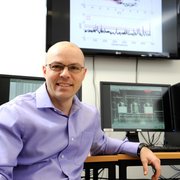Industry 4.0 is revolutionizing the manufacturing and resource industries. It is now possible to computerize a company’s entire supply chain using wireless sensors, software, and other advanced technologies with a view to optimizing production and product quality. These tools help companies react faster to market changes. UL researchers in software engineering, mathematics, and chemical engineering are putting their skills and expertise in big data, artificial intelligence, and mathematical modelling to work for the benefit of industry. They are creating custom software solutions to optimize supply chains, designing digital simulations that account for the full complexity of manufacturing processes, and using statistical methods and virtual models to analyze, monitor, and optimize processes.
Explore research on processes and computer-integrated manufacturing
The faces of process and computer-integrated manufacturing research
Virtual models and industrial process optimization
Process optimization starts with observation—extracting reliable data from cause-and-effect relationships between variables in order to develop virtual models used to understand and predict a system’s complex behaviours. In the optimization phase, these results serve as a basis for continuously modifying the process to maximize production and product quality while reducing costs and energy consumption.

Carl Duchesne, professeur titulaire, Department of Chemical Engineering
Member of the Aluminum Research Centre and the Big Data Research Centre
Professor Carl Duchesne specializes in using multidimensional statistical methods to analyze, monitor, and improve industrial processes for quality control purposes. One of Professor Duchesne’s projects in the Process Observation and Optimization Laboratory (LOOP) involves building predictive models that ensure the stability of pharmaceutical tablets. The models must be capable of detecting changes in the quality of raw materials and manufacturing conditions that could pose risks for product stability.
Modelling and simulation of complex systems
The remarkable progress in computer science in recent years has now made it possible to use computers to model and simulate highly complex phenomena. Algorithms can be optimized to obtain stable and highly precise formulations. Given the complex problems many industries face, digital simulations are often the only way to get a better handle on manufacturing processes with a view to producing high quality, value-added products. This is a good example of the contributions mathematics can make to applied science.
My project aims to support coordinated decision-making at the procurement and production system levels. I want to help people work together more effectively to deal with constant changes in available resources by harnessing the concepts of data quality, uncertainty, and collaboration.
Vanessa Simard, PhD student in mechanical engineering (concentration in industrial engineering) supervised by Nadia Lehoux, professor, Department of Mechanical Engineering
Graduate studies
Make the leap to graduate studies
Explore our programs of study based on your interests
Logistics network optimization
Managing natural resources for processing requires collaboration between multiple stakeholders and decision makers who do not share the same objectives or planning processes. Resource management also involves other challenges, including the need for significant long-term investment, the substantial quantities of raw materials and products involved, and the fact that processes are often based on uncertain information and data. UL researchers are developing software systems that coordinate activities across entire industries and process and analyze vast amounts of data in order to optimize supply chains from raw materials to customers. Interconnecting all of a company’s operations facilitates decision making and improves profitability.

Jonathan Gaudreault, professeur titulaire, Department of Computer Science and Software Engineering
Director of Consortium de recherche en ingénierie des systèmes industriels 4.0 and codirector of FORAC
Jonathan Gaudreault draws on his expertise in artificial intelligence, industrial engineering, operations research, and other areas to develop smart decision support software tools that solve industrial problems. Along with his colleagues, he created custom software for the forest industry to optimize the use of lumber kilns in saw mills. The software takes into account both firm deliveries and anticipated demand.
The tools developed under the Educational Leadership Chair in Industrial Data Analysis and Chemical Engineering will help engineers detect problems more quickly. This will lead to reduced production costs and improved productivity.
Carl Duchesne, professor, Department of Chemical Engineering
